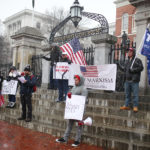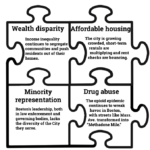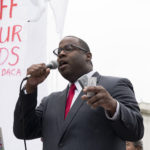
With the Boston municipal elections coming up in November, we at The Daily Free Press want to keep students up-to-date on all the latest election developments. Here is a run-through of this year’s City Council candidates in the Boston University area, as well as the candidates battling it out in the mayoral election.
City Council Election
The two districts most relevant to the BU area are District 8, which represents Back Bay, Beacon Hill, Fenway, Kenmore Square, Mission Hill, Audubon Circle and the West End, and District 9, which represents Allston-Brighton. In District 8, incumbent City Councilor Josh Zakim is being challenged by political newcomer Kristen Mobilia. In District 9, incumbent Mark Ciommo is being challenged by two candidates, Brandon Bowser and Alex Golonka.
District 8
Josh Zakim: The incumbent candidate, Zakim was first elected to his position four years ago in the last municipal elections. Zakim is a Back Bay resident, and a licensed attorney. On the council, Zakim chairs the Committee of Housing and Community Development, through which he has addressed housing concerns of disproportionately at-risk tenants, including the elderly, disabled, low-income and those in the LGBTQ community, according to his campaign website.
In an email to the Daily Free Press, Zakim said he hopes to lead the district for another term.
“I am proud of what we’ve accomplished over the last four years, but there is more work to do,” Zakim said. “I look forward to continuing to serve the residents of District 8 and the people of Boston.”
Kristen Mobilia: Boston community activist Mobilia is the sole challenger to incumbent Zakim to represent the neighborhoods of District 8 in Boston’s City Council. Mobilia has worked in finance and human resources fields for over 20 years, including startups and nonprofits. She also serves as a board member of the Fenway Garden Society, Inc. A theme throughout her campaign is the importance of community relationships, including communication between neighborhoods and City Hall.
District 9
Mark Ciommo: First elected to the Boston City Council in 2007, Ciommo has now served as the City Council representative for District 9 for two four-year terms. Serving as the Chair of the Committee on Ways and Means, the committee that oversees the Council’s review of the city budget, Ciommo allocates funds towards community-based projects. Born and raised in Allston-Brighton, Ciommo became the first person in his family to graduate from college and worked various custodial jobs at local hospitals.
Brandon Bowser: Bowser is an educator who has worked in the Allston-Brighton area for the past five years. Given his background in education, Bowser has a strong connection with local schools and displays similar support for local artists, according to his campaign website. Bowser said he is particularly focused on affordable housing and fair development within the Allston-Brighton neighborhood.
“I think it’s time for fresh leadership. For a forward thinking candidate to step up and advocate for the future of Allston-Brighton,” Bowser said.
Alexander Golonka: Golonka, who calls himself “The progressive choice” is focused primarily on fair housing, fair employment, equal education and improving transit within the city. In addition to advocating for a $15 minimum wage, Golonka is looking to balance out the scales in other problem areas, including fighting to reverse recent budget cuts in areas such as early education, as well as supporting renter’s rights, according to his campaign website.
In an email to the Daily Free Press, Golonka expressed his concern over the rising cost of living in the city.
“I’m running because I’ve been living through the housing crisis in Boston for the past 10 years and am sick of the lack of progress,” Golonka said. “My friends, family and I have spent many good years in Boston, I want us to continue being able to afford that.”
Mayoral Elections: Walsh vs. Jackson
Sworn in on Jan. 6, 2014, Boston Mayor Martin Walsh will face a challenger to his position, City Councilor Tito Jackson for Boston’s District 7.
Martin Walsh
Housing: With their “Housing a Changing City: Boston 2030” plan, part of the larger Imagine Boston 2030 Plan, the Walsh administration has broken ground on thousands of new housing units and are on track to reach their goal of 53,000 new units by 2030, in order to accommodate the city’s rapidly growing population. The Walsh administration has also taken action to address the city’s rampant homelessness issue by building a new homeless shelter, and allocating millions in funds to support existing homeless shelters and rehousing programs that can offer homeless people permanent housing as part of their “Action Plan to End Veteran and Chronic Homelessness in Boston.”
Drug Abuse: Throughout his term, Walsh has been personally invested in fighting the opioid crisis, as well as the larger issue of drug abuse. Within the city, Walsh has participated in and allocated funds for projects such as the Melnea Cass Boulevard and Massachusetts Avenue cleanup, an ongoing endeavor to revitalize the neighborhood and offer increased recovery services to those struggling with addiction. Given his track record of addressing the issue of drug addiction within the city, Walsh was named the chair of a national task force on substance abuse, prevention and recovery services in October 2015.
Income Inequality: Given the growing wage disparity among the population, Walsh has made closing the income gap a key part of his services in the city. In addition to establishing the Office of Financial Empowerment, which aims to provide resources and services to support low-income individuals, the Walsh administration has also partnered with the Boston Planning and Development Agency, as well as the United Way of Massachusetts Bay and Merrimack Valley, to launch the Boston Citywide Credit Building Program. In addition to his services within the city, Walsh has been recognized at the national level as the founding vice-chair of the Cities of Opportunity Task Force at the U.S. Conference of Mayors.
Education: Since coming into office in 2014, Walsh has dedicated a large portion of his time to addressing issues in the public school system, from the early stages of kindergarten to the final stages of community college. Some of his work includes adding hundreds of additional seats in kindergartens, funding longer school days and, most recently, announcing tuition-free community college for graduates from Boston public schools.
Tito Jackson
Housing: Jackson has made it clear that offering affordable housing to people of all economic backgrounds is a vital part of his campaign, and will continue to be if he is elected. Jackson has also expressed concern that the city’s current 13 percent affordable housing requirement of new construction is not enough to provide housing for all of Boston’s citizens given the current housing crisis. In light of this situation, Jackson has pledged to push an increase of 7 percent, which would leave the affordable housing requirement at 20 percent, according to his campaign website. In regards to the 2016 budget proposal, Jackson advocated strongly for the Housing First Program, which would fund 400 housing vouchers for the increasing amount of homeless families within the city, according to his campaign website.
Drug Abuse: Jackson has said that the opioid crisis in Boston has remained largely unaddressed, and he hopes to tackle the issue through a multi-partner strategy of detox, counseling and training, according to his campaign website. In addition to tackling this issue, Jackson was also a staunch supporter of successful Massachusetts Ballot Question 4, legislation that legalized recreational marijuana use in Massachusetts, as he was troubled by the disproportionate rates of incarceration for drug use in communities of color, according to his campaign website.
Income Inequality: With the cost of living in the city continuing to increase at a much higher rate than the average wage, Jackson has turned his attention to the future generation of workers. As part of his budget proposals, Jackson has pushed for a Summer Youths Job Program to fund 5,000 summer and 1,000 year-round youth jobs in the city, in order to stabilize the rest of the community, according to his campaign website.
Education: As Chair of the Committee on Education, Jackson has been and continues to be invested in Boston’s public education system. If elected, he said he hopes to restore cuts made to autism and trauma students, provide a nurse in every school and focus on teaching profitable skills that will benefit students in the future, according to his campaign website. During his visit to BU in April, Jackson said he would like to move away from standardized assessment culture and reintroduce hands-on learning to local public schools.
In addition to Jackson and Walsh, Joseph Wiley, a 68-year-old gay man of color from Roxbury, has also thrown his hat into the ring. Having always been interested in politics, Wiley attempted to run for Mayor in 2009, but only now has he received the 3,000 signatures needed to enter the race. On the top of Wiley’s list for reforms in Boston is affordable housing, an issue that he treats with the utmost importance.





Advocate your favorite Candidate for Boston City Council open the City Stenographer Stenographic Record of Public Meetings of City Council for hard of hearing folks, for ESL English Second Language folks, for all folks! Civic engagement with Boston City Council can be improved with access to the City Stenographer Steno Record.